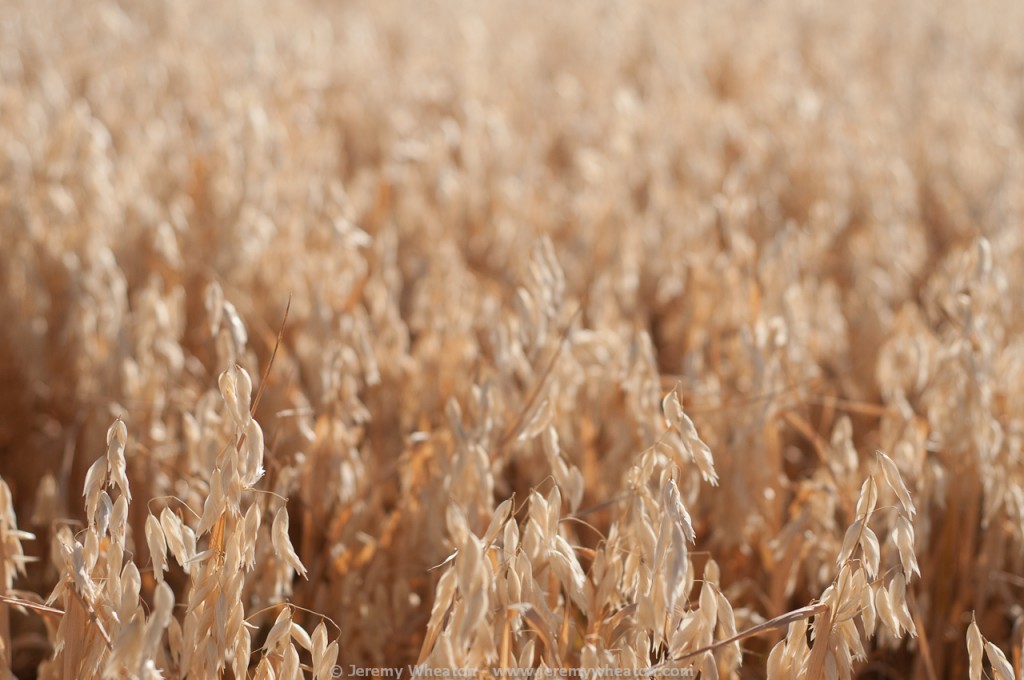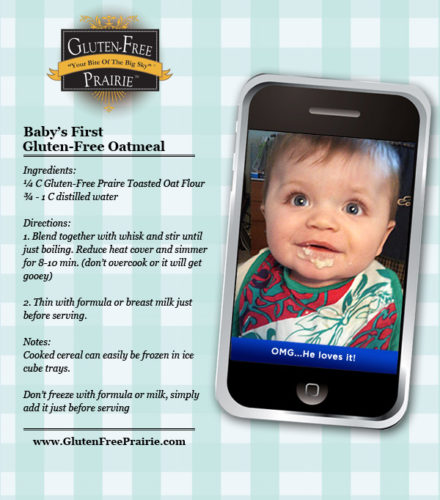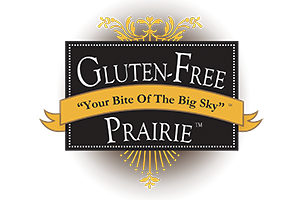
-
Are oats baby’s perfect first cereal?
Oats are a wonderfully healthy grain and they may be baby’s perfect first cereal, replacing rice as the go-to in generations past. In 2012 the FDA launched a formal investigation into arsenic levels in rice. Consumer Reports discusses arsenic in rice: “The results of our tests were even more troubling in some ways than our findings for juice. In virtually every product tested, we found measurable amounts of total arsenic in its two forms.” In 2016 the FDA issued another, stronger warning regarding high levels of arsenic in rice cereal. Easy to digest and less binding than rice, oatmeal brings fiber, calcium, protein and even some B vitamins to a baby’s growing body! Use oat flour to prepare creamy oats and give babies the full health benefits of oats.

-
Are oats the perfect breakfast for growing minds?
Oatmeal is low-glycemic. This slow-digesting, high-fiber option leads to better focus and mental performance throughout the day. Oats are also high in complex carbohydrates and soluble fiber, which means they release energy slowly. That morning bowl of oatmeal could provide all the energy a child needs until lunchtime.
-
What about childhood obesity?
A study of 10,000 children by researchers at New York’s Columbia University found that among those who regularly ate whole-oat product, the proportion of overweight children was almost cut in half. Researchers at Oxford Brookes University also found that those eating foods with a low glycemic index (GI), such as oats were less likely to binge on sugary snacks. Foods with low GI rating release glucose into the body more slowly and evenly, leaving you feeling full longer.
-
Are oats the perfect choice for athletes?
Oats are becoming the go-to protein and nutrient choice for all types of athletes. Oatmeal is a great source of energy and is a complex, slow-burning carb which is essential for building and strengthening muscle. Oats are rich in oxygen-carrying iron and energy-releasing B vitamins, nutrients essential to peak athletic performance. Plus, they’re packed with soluble fiber, called Beta Glucan which is paramount to managing cholesterol levels and a healthy weight. Beta glucans are soluble fibers found in oats that benefit the body in many ways. First, they keep you full, aid in regularity, assist with removing cholesterol from the bloodstream, and provide a leaner waistline. This is helpful for athletes looking to stay energized, healthy, and keep a toned, lean look to go along with their plant-powered muscles. Oats have been said one of the best foods to reduce excess abdominal weight and are one of the most prized foods for withstanding athletes through long, grueling workouts.
-
Are oats the perfect choice for every age?
The Mayo Clinic lists Oats as #1 in the top 5 foods to lower cholesterol. Oatmeal contains soluble fiber, which reduces your low-density lipoprotein (LDL), the “bad,” cholesterol. Soluble fiber (beta glucan) can reduce the absorption of cholesterol into your bloodstream. Five to 10 grams or more of soluble fiber a day decreases your total and LDL cholesterol. Eating 1 1/2 cups of cooked oatmeal provides 6 grams of fiber.
-
Avenanthramides
While the benefits of beta glucans in oats is making mainstream news, we hope that this little known group of antioxidants will start to make news too. Oats are the only grain to contain this potent antioxidant which multiple studies report suppress the development of atherosclerosis (hardening of the arteries), lower blood pressure and help prevent colon cancer. Pretty exciting news about this humble little grain.
-
Protein
Everyone wants more protein – and oats are the perfect plant-based way athletes get their protein. One serving of oats contains as much protein as one egg, often thought of as the most prized source of protein. Try oats in your smoothie for a powerful protein punch.
-
B vitamins
B vitamins improve your energy, brain health, and muscle function. Oats offer an immediate hit of B vitamins, one half cup of oats will provide you with quality B vitamins that will leave you energized for hours.
-
Iron
Oats contain around 4 milligrams of iron per 1/2 cup. That’s nearly 1/3 of the daily recommended amounts (18%)! Eating iron-rich foods like oats with a source of Vitamin C (such as berries, greens, lemon, oranges, apples, kiwi, and peppers) is an easy way to boost absorption of this important mineral. Athletes need iron to maintain energy just like anyone else, so choose the best plant-based sources such as oats, greens, chia seeds, spirulina, beans, legumes, and even cacao!
-
Magnesium
Magnesium is an essential mineral for athletes who are looking to recover properly after a workout. Magnesium helps relieve sore muscles, encourages repair and regrowth of muscle cells, and lowers cortisol in the body, the stress hormone that’s elevated during exercise. While cortisol is helpful when you’re working out and in need of speed and adrenaline, you don’t want it elevated for a long period of time after a workout. A lack of magnesium can cause fatigue that no athlete (or anyone else) wants, can lead to insomnia, and can cause inflammation that impairs future workouts. Oats contain 275 milligrams of magnesium in just 1/2 cup dry rolled oats (1 cup cooked).
Oats are a great addition to any diet, especially an athlete’s diet. If you’ve skipped out on oats until now, give this healthy grain a bit more attention in your diet from now on! Gluten-Free Prairie oats are higher in protein than many other varieties and are also simply the purest on the planet. GFP sources only Purity Protocol Oats which are third-party certified by CSA requiring testing at 3ppm or below.
